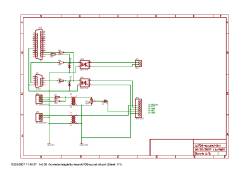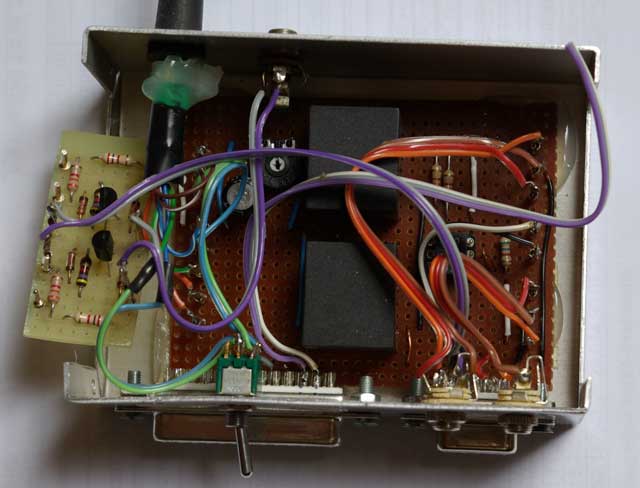 'Scrapbook' with my PC-Transceiver Interfaces
'Scrapbook' with my PC-Transceiver Interfaces
CW keying interface for IC-251
For a recent Marconi contest (11/2006, 2m CW) I wanted to do a few QSOs... The solution was to couple the laptop with the IC-251 transceiver:
- the software used is CWtype 2.01 by DXsoft [1], it works usually via the parallel port (the laptop in use still has this feature)
- the keying input (at the rear side of the transceiver) is controlled by a BC517B (darlington transistor) connected to one pin of the LPT port
- switching the PTT (via front panel 8-pin MIC-connector) via a BC517B lits the 'Tx' lamp but doesn't switch on Tx mode - the remaining voltage over the BC517 (approx. 0.67V) is too high - thus I used a BS170 (n-FET).
- NF-out of the transceiver is coupled with MIC-In of the sound card
CW keying interface for IC-706MkIIG
The CW keying is done via the 6.3mm plug of the transceivers backside.
- the software to be used is CWtype 2.01
- the keying input is controlled by a BC517B (darlington transistor) connected to one pin of the LPT port
- another BC517 is foreseen to control the PTT, this 'channel' is not yet used
- the TRX is put in semi-BK mode, the setting CW Paddle is Off, when it is keyed it starts to transmit without the need to use the PTT
Interface to IC-706 for PSK31 and CW
Many proposals for interfaces can be found in the Web and in other literature, a very versatile interface named 'Digi-1' can be purchased [2] (but I haven't copied the circuit from there). My cheap solution acts in a similar way:
- the laptop used is an elderly Acer 435LCi, its soundcard is partly broken (one channel) and the levels seem to be weak
- NF sending and receiving lines use transformers between sound card and transceiver
- PTT is implemented using CNY17-2 opto coupler, connected to RTS of serial interface
- the serial interface is an USB-to-serial converter, thus the max. voltage level is only +/- 6.6V
- the DTR control line of the serial interface is used for (CW) keying purposes, therefor a second CNY-17II is used
- the interface is connected to the rear MIC outlet of the IC-706, I have halfed an UTP Cat 5 network cable to get the 8-pin connector
- a switch with two separate contacts allows to interrupt the MIC and PTT lines to the TRX, this is especially helpful when the PC is booting or to stop any unwanted emission of the TRX

Issues:
- additional noise on receiving line when transceiver ground and PC ground are connected, thus I have used the transformers
- during PC (and/or USB-serial-converter initialisation) the plug should not be connected or the IC-706 must be off, the same happens also when another USB-device is attached/detached to/from the USB (obviously a consequence of the USB enumeration procedure)
- when the serial converter is connected to the interface, additional noise around 1.5 kHz is observed
- the resistor in in series with the CNY17s LED is lower, probably a darlington opto coupler can operate with a higher resistor value (4N33 as in Digi-1 circuit ?).
- when operating both control lines of the serial interface, there is a problem with the PTT control, has to be further investigated. Probably both CNY-17s draw too much current (charge pump in level convertor?)

The extra small board contains the interface circuit for the CW control (originally not forseen on the board). It is just stuffed 'head over' into the box, thus a sheet of isolating epoxy paper is glued into the metal case. This board can be replaced also by another one containing opto couplers instead of the BC517B darlingtons.
Extensions:
- the MIC and the PTT lines can be interrupted by a two level switch, just to avoid unwanted signal transmission
- the LPT port can be also connected to the device, a switch selects then between COM or LPT (or only one connector may be plugged in at a time - the option I am using)
- The annoying activity of the TRX during USB enumeration could't be avoided (see experience with newer laptop) by using the latest driver for the USB-to-Serial interface from FTDI - what a pity.
Worth to be mentioned:
I appreciate very much the support by means of discussion and with the final testing
'on air' of the interface by Rolf, DJ2KUA. We did together our first PSK31- and RTTY-QSOs
on 144 Mc during one 'test night'. Now we are looking forward to the
AWG 2m-PSK31 activity
contest to be held on 14/04/2007.
I also thank Swen, DL1SG for the first unsuccessful tests (from my side) were
unfortunately something on the board was broken.
In the meantime a number of QSOs have been performed as LU/DC2IP expecially in the
Russian PSK31 contest 2007 and as DC2IP in the EA PSK31 contest 2007.
More ...
References
- [1] CWtype from DXsoft, see also for alternative download
- [2] DIGI-1, a versatile soundcard interface, test report (in German) and technical description from the shop web site of Wimo